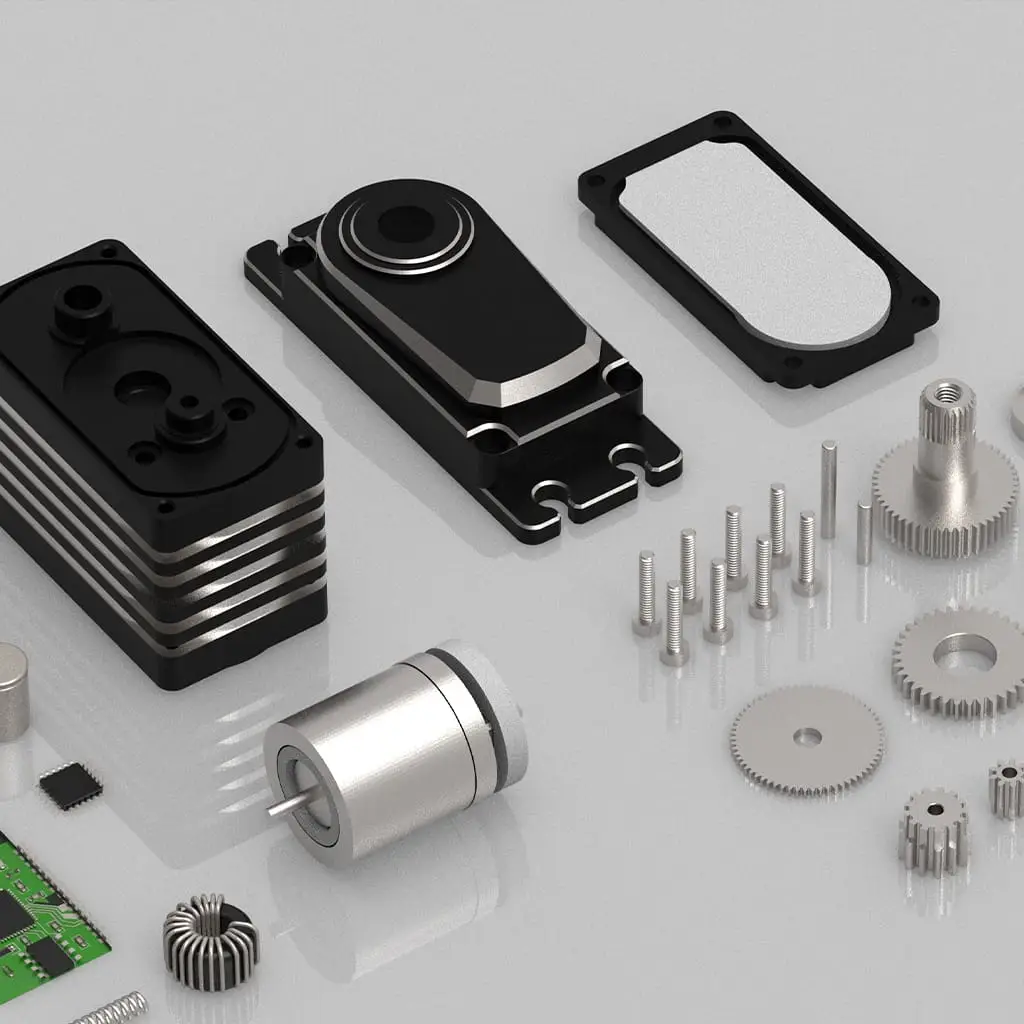In the field of servo technology, plastic gear servos have long held an important position. Although metal gear servos perform impressively in high-end markets, plastic gear servos maintain widespread market applications due to their unique advantages. This article will use GXServo products as examples to analyze the technical characteristics and irreplaceable market value of plastic gear servos in depth.
1. Technical Characteristics of Plastic Gear Servos
Plastic gear servos use engineering plastics (typically POM or nylon composites) for their transmission systems. GXServo’s plastic gear servos employ polymer composite materials and precision injection molding to manufacture gear sets, achieving an excellent performance-to-price ratio.
The performance of modern engineering plastics has improved significantly. For example, GXServo’s classic plastic gear servo SG-90 uses reinforced nylon composite material with tensile strength exceeding 80MPa, approaching the strength of some aluminum alloys.
2. Core Advantages of Plastic Gear Servos
- Exceptional Lightweight Properties
The density of plastic is only 1/7 to 1/4 that of metal, giving plastic gear servos an absolute advantage in weight. GXServo’s micro plastic gear servos weigh less than 10g, making them particularly suitable for weight-sensitive applications such as aircraft models and micro-robots. - Excellent Cost-Effectiveness
The material and processing costs of plastic gears are significantly lower than those of metal gears. GXServo’s plastic gear servos typically cost only 1/3 to 1/2 of comparable metal gear products, making them highly competitive in large-volume applications. - Quiet and Smooth Operation
The low friction coefficient and self-lubricating properties of plastic result in noise levels 10-15 decibels lower than metal gears. GXServo further reduces operational noise through gear profile optimization, making these servos suitable for environments requiring quiet operation. - Strong Corrosion Resistance
Engineering plastics have natural resistance to water, acids, alkalis, and other corrosive substances. GXServo’s waterproof plastic gear servos are particularly suitable for applications in humid environments such as ship models and outdoor surveillance. - Maintenance-Free
Plastic gears typically do not require additional lubrication, reducing maintenance efforts and contamination risks. GXServo’s maintenance-free design ensures reliable operation even in hard-to-reach installation locations.
3. Application Scenarios for Plastic Gear Servos
Based on the above advantages, GXServo plastic gear servos perform exceptionally well in the following scenarios:
- Consumer-Grade Remote-Controlled Models
Entry-level and intermediate remote-controlled cars, boats, and aircraft models are cost-sensitive, making plastic gear servos the best value option. GXServo’s economy series is widely popular in these markets. - Educational Robotics
School robotics courses and competitions often require large numbers of servos, where the low-cost advantage of plastic gears is fully utilized. GXServo’s education-specific series offers specially designed durable models. - Lightweight Mechanical Structures
For applications with light loads such as desktop robots and small automation equipment, plastic gears are entirely adequate while reducing overall weight. - Short-Term, High-Volume Projects
For products with short life cycles or rapid prototyping needs, the low cost of plastic gear servos makes them a more economical choice. - Noise-Sensitive Environments
Indoor service robots and medical equipment requiring quiet operation benefit from the low-noise characteristics of plastic gears.
4. Technical Limitations of Plastic Gear Servos
Plastic gear servos also have some inherent limitations:
- Limited Load Capacity
Although the strength of modern engineering plastics has greatly improved, it still falls short compared to metal. Continuous high loads can lead to tooth surface wear or deformation. - Temperature Sensitivity
The mechanical properties of plastic are significantly affected by temperature, potentially softening at high temperatures and becoming brittle at low temperatures. GXServo has improved temperature stability through special formulations, but the operational temperature range remains narrower than that of metal gears. - Long-Term Creep
Plastic undergoes slow deformation under continuous stress, affecting long-term accuracy retention. High-precision applications require periodic calibration. - Weak Impact Resistance
Sudden overloads may cause gear breakage rather than simple wear, necessitating additional overload protection designs.
5. Technological Innovations in GXServo Plastic Gear Servos
GXServo has made several technological innovations in plastic gear servos:
- Nano-Composite Reinforced Materials
Adding nano-scale reinforcing fibers to the plastic matrix increases gear strength by over 40%, approaching the performance of entry-level metal gears. - Self-Healing Tooth Surface Technology
Special plastic formulations enable slight wear to self-repair through molecular chain reorganization, extending service life. - Modular Quick-Release Structure
Simplifying the repair process allows fast gear replacement even after damage, reducing overall usage costs. - Intelligent Overload Detection
Current monitoring predicts overload risks and provides early warnings to prevent catastrophic damage.
6. Selection Recommendations for Plastic Gear Servos
When choosing GXServo plastic gear servos, consider the following factors:
- Load Assessment
Ensure working torque does not exceed 60% of the rated value, leaving sufficient safety margin. - Duty Cycle
Intermittent operation is more suitable for plastic gears than continuous operation, aiding heat dissipation and stress recovery. - Environmental Conditions
Avoid extreme temperatures and chemical corrosion, or select specially protected models. - Life Expectancy
Choose products with appropriate grades based on project life expectancy to avoid over-engineering and cost waste.
7. Conclusion
Plastic gear servos maintain an irreplaceable position in many applications due to their lightweight, low-cost, and quiet operation advantages. Through continuous innovation in materials science and structural design, GXServo has achieved impressive performance levels in its plastic gear servo products while retaining cost advantages. For applications with moderate loads, cost sensitivity, or weight constraints, plastic gear servos are often the best choice. As material technology advances, the performance boundaries of plastic gears continue to expand, promising stronger competition with metal gears in more fields in the future.

